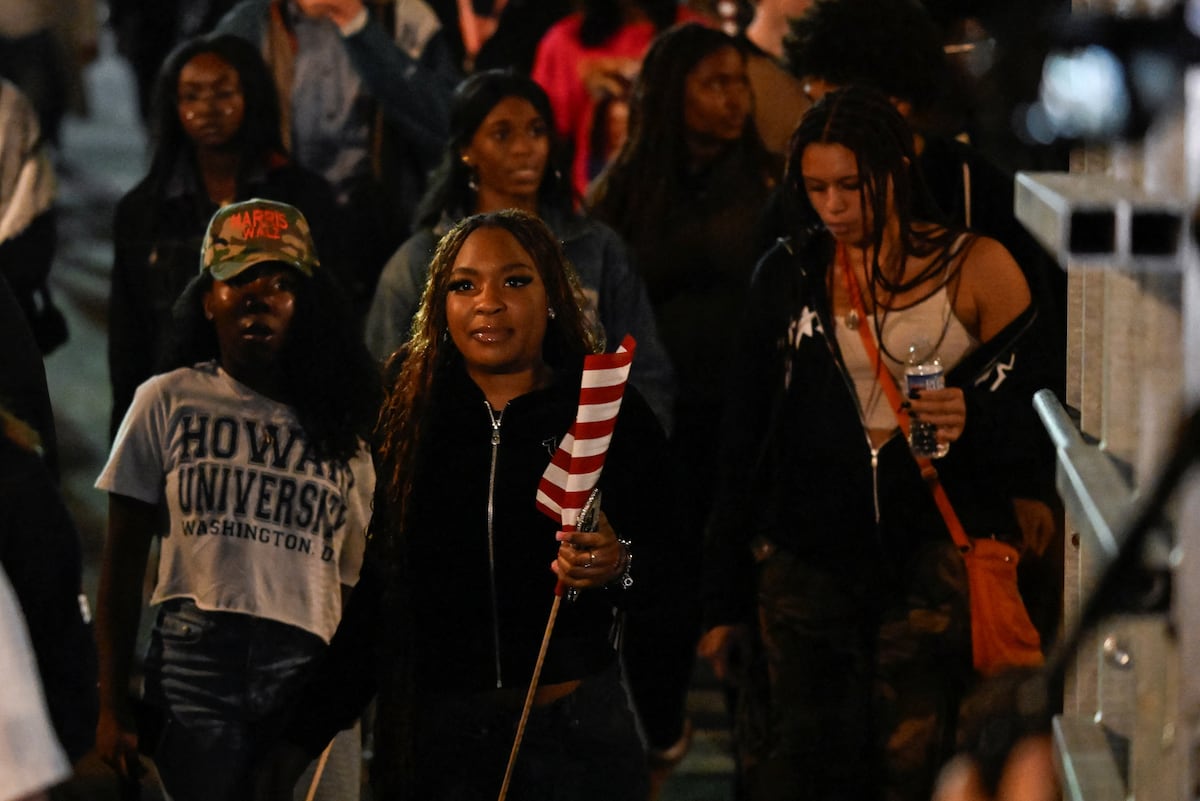The Democratic Party woke up this Wednesday with the most difficult dish to digest after Tuesday’s elections in the United States: the resounding victory of Republican Donald Trump and, consequently, the defeat of its candidate, Kamala Harris, who canceled her party early in the morning. counting at Howard University (Washington); the loss of control of the Senate; and the very real prospect of Republicans holding the House of Representatives. The red tide (the color of the conservative formation), which was expected and did not occur in the 2022 midterm elections, finally arrived. Creating a political tsunami.
Harris telephoned his opponent after noon to congratulate him on his victory. In the conversation, the vice president stressed to Trump the need for “a peaceful transition of power” and to govern “for all Americans,” according to a senior official in her campaign. After this congratulatory gesture, which the past and future president never had towards Joe Biden in the 2020 elections, the former Democratic candidate plans to address her supporters throughout the afternoon of this Wednesday in Washington, at Howard University where studied and where he should have appeared last night if he had won. Or if there had been closer results.
Now, the only Democratic hope is that the handful of pending seats in the House of Representatives fall on their side and that the leader of their caucus, Hakeem Jeffries, becomes the president of that institution and is the second man – because The next four years will be very masculine—more powerful in Washington structures.
The desolation among the party and among its voters had been evident throughout the night, when the joy that had been feverish at the time of the first closing of the polls on the East Coast gradually transformed into nervousness first and stupor later. . Democratic campaign workers in the Yard, the concourse in the center of the Howard campus, gritted their teeth. Among the thousands of students and party sympathizers who had come to celebrate what they hoped would have been the triumph of the first black woman president of the United States, discreet escapes began in search of the exit doors.
An email from Jen O’Malley Dillon, Harris’ campaign manager, tried to instill optimism when the television networks declared that the first swing states, Georgia and North Carolina, fell to the Republican side. “We always said that our clearest path was through the blue wallhe recalled in reference to the States of Pennsylvania, Michigan and Wisconsin. And he added: “We like what we are seeing there.”
By then, however, the count already indicated that Trump would take the electoral votes from the three fundamental territories for the Democrats. The email ended with the advice to rest. The final signal for the trickle of escapes to begin to become a river. By the time Cedric Richmond, co-director of the Democratic campaign, came to the stage to announce that Harris would not address her voters that night, but would do so on Wednesday, the senior official found an already half-empty Yard.
Harris had to face a formidable challenge in record time. After becoming the Democratic candidate, she developed a competent campaign that managed to enthuse her supporters. Or part of his own: progressive and pro-Palestinian groups never accepted that he did not distance himself from Biden in his support for Israel in the war in Gaza. That rejection, transformed into abstentionism or support for other candidates, may well have cost him states like Michigan.
At the very least, he managed to give the Democrats an opportunity, while the prospects were dire in the final weeks of the candidacy of a Joe Biden in clear physical decline. Milestones such as the Democratic convention or, above all, the debate against Trump in Philadelphia at the beginning of September in which she clearly won, gave her a boost that placed her, although only very slightly, ahead in the polls. In a political environment in which voters demanded the most radical change possible, however, he could not attract undecided or moderate Republicans who are repelled by Donald Trump’s personality.
Something that his rival did know how to do, who despite having held the presidency for four years, managed to establish in the minds of most of the voters an image of a decisive leader, the one who was going to turn around for the purposes of three years. of inflation. His campaign turned the memory of that mandate into a golden era in which there was no inflation or wars. He also managed to ensure that the assault on the Capitol in January 2021 or his insults and threats to his political adversaries went unnoticed. Hairs to the sea.
Trump has achieved, according to polls, progress among young people and especially among Latino men, 54% of whom leaned for him in these elections. 13% of African Americans supported him, compared to 8% four years ago. Among the entire Latin community, the 32% who gave him their vote in 2020 has become 45%, according to exit polls by the CNN television network. Women, whom Harris hoped would be his greatest asset because of their support for abortion rights, only took his side by 54%.
Harris, the vice president of an extremely unpopular Biden, never knew how to present herself as the candidate of change. Nor adequately explain his changes in position on issues such as the extraction of shale gas, which he condemned in 2019 and blessed in 2024.
Perhaps the key moment came on October 8, with the milestones that promoted it already distant in the public’s memory. In an interview on the television program The Viewconsidered “kind” toward the candidate, was asked what he would do differently from Joe Biden if he became president. She replied that she couldn’t think of anything, in a comment that dismayed her team and that the republic campaign quickly went viral. In subsequent interviews, he attempted to correct himself and ensure that his Administration would not be “a continuation of the Biden Administration.” But by then, the damage had already been done.
Political strategist Frank Luntz believes that, until then, Harris had been “the best possible candidate.” From then on, it was “horrible.” As was the case with Hillary Clinton in 2016, she spent more time declaring why Trump should not be president than explaining why she was the right candidate.
The polls began to accuse him immediately. As October progressed, the small advantage he had gained slowly evaporated. A slight recovery in recent days was not enough. A highly regarded poll that gave him a three-point lead in heavily Republican Iowa turned out to be nothing more than a mirage.
Now, for Democrats, a stage of reflection begins to determine where exactly the failure was. The knives are already beginning to sharpen, and the recriminations: whether Biden should have retired earlier to give her more time to define herself before the voters and leave less space for Trump. What if she should have chosen as her number two not the governor of Minnesota, Tim Walz, but the governor of Pennsylvania, Josh Shapiro, recommended by the party hierarchy as someone who could win the key state in these elections. But crying over spilled milk has never been practical. From now on, Democrats will have to look to the future — or risk political irrelevance for years.







